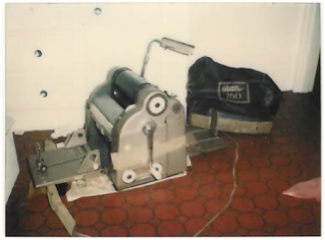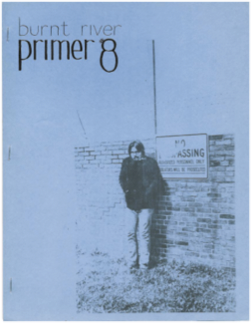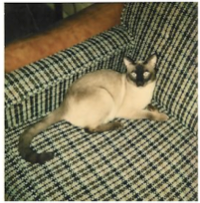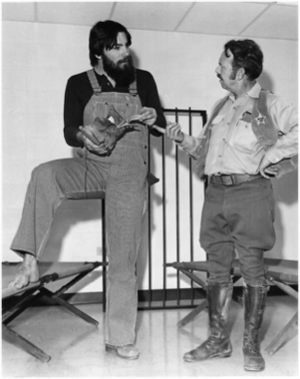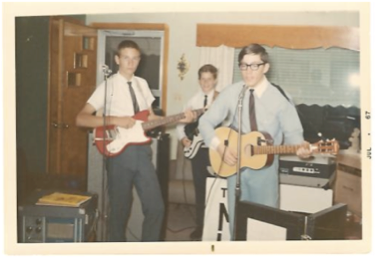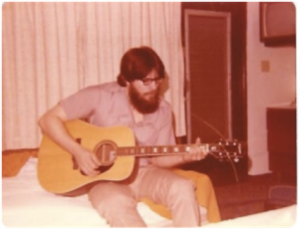Work
After returning to Cleveland from college, Alan was hired in 1974 by H.K. Ferguson, an engineering company, and began working as an instrumentation designer on processing jobs for clients like Budweiser and DuPont. It was here that he met Dave Pishnery, a draftsman and poet and Rich Pike, an engineer. This was his day job, but poetry and music filled his spare time. Ferguson sent him several times to the Williamsburg Virginia Budweiser facility on assignment.
The company asked Alan to relocate to their San Francisco office on a temporary assignment in May of 1981. This led to a permanent position which lasted until 1984. (Photo Alan, Pishnery, Pike, Werner)
Alan was hired in February, 1986 by Pacific Gas Transmission (PGT), a natural gas company (subsidiary of the California utility company Pacific Gas & Electric) whose pipeline transported natural gas from the Canadian border to California. For 10 years starting in 1989, Alan worked on construction field assignments as an electrical inspector at the pipeline’s compressor stations in remote areas in Oregon, Washington and Idaho. As he drove to and from the Pacific Northwest and our home in the Bay Area before and after each assignment, he enjoyed the Columbia River Gorge, Smith Rock, the lava cast forest in Bend, and the John Day Fossil Beds, to name a few. It was on one of these field assignments that he met Frank Francek, a mechanical inspector also with PGT, and they developed a lasting friendship. On his assignments, he stayed in towns such as Bend Oregon, Spokane and Walla Walla Washington. He also stayed in very small towns at mom & pop motels, where he paid a little extra for the use of a TV remote. He and I would exchange many “thinking of you” cards and I would travel to see Alan every third Friday to spend the weekend together. During this time period, Alan wrote poems, but didn’t have time or energy to publish. His field assignments lasted anywhere from 3 to 9 months a year and, with 10-14 hour days - 6 days a week when needed, it was a strenuous job.

When his company moved from San Francisco to Portland in 1995, Alan and I settled in Vancouver, Washington. The company phased out its construction department, and Alan worked as an analyst in the planning department. They owned a new building on the waterfront and, after a few years, leased some space to Enron with an option of leasing additional space. Later, Enron kicked them out of their building so PGT took office space in a different part of town. Alan carpooled with 3 other employees who eventually were offered early retirement packages. So Alan drove to work listening to music tapes. During this time, he served as head of the safety committee and headed up the United Way campaign. When his health started to decline, he started taking the bus. Alan published his poems about working in an office and taking the bus in his books Office Coffee in 2004 and Bus Pass, his collection of poems, published in Measured Steps in 2003.
Poetry
In 1967, Alan’s 9th grade English teacher passed out the poem “one death in the life of julie,” written by 1960s Cleveland poet d.a. levy. Alan wrote that this was when he became interested in poetry. The teacher collected the poems at the end of class since the poem, at the time, was considered pornographic. In 1968, Alan read d.a. levy’s suicide notice in Cleveland’s newspaper,
The Plain Dealer. In 1970, Alan started looking for levy’s poetry at libraries. In 1975, he began corresponding with rj Sigmund (a friend of levy’s) and offered to help him with his productions. Alan also delivered free produce from rj’s garden to others in the area. In return, rj gave Alan the mimeograph which he and Tom Kryss (another levy friend) used to print
ukanhavyrf**kincitibak, the first collection of levy’s work and testimonials - and one of rj’s Siamese kittens.
In 1974, Alan started soliciting poems from local Cleveland poets that he published in his 1
st magazine
Burnt River Primer. In 1975 he printed his first rare levy publication, a reprint of levy’s
Tombstone as a Lonely Charm. As Alan wrote… “I collated and bound every copy. All silk screens and art work were done by Mike Schaefer. Richard Werner created individual paintings for a number of publications. Dave Pishnery helped with the bag of poetry on the inside back cover of
White Heap 01, and Rich Pike lent moral support and a blues harmonica during the early years.” He arranged poetry readings at various locations, among them Bobby McGees with music provided by singer/songwriter Gary Hall. Even, in the late 1990s, Alan sent money to Gary Hall to buy strings for his guitar. Alan went on to produce 2 additional magazines in Cleveland
, Burnt River Primer and White Heap.
In his solicitations under his 1st press Falling Down Press, Alan used the name Stuck-in-Nowhere as the editor and started receiving letters and some strange phone calls from people asking for Stuck-In-Nowhere. Alan named his cat Stuck-In-Nowhere (SIN for short). When Alan received such a phone call, Alan would put SIN on the phone. He recounted that when the cat was bad and Alan was yelling “SINNER! SINNER!” little did the neighbors know he was talking to his cat. SIN participated in a poetry reading at the Coventry library, having been snuck into the library in a gym bag. In 1977 he bought his second paste ink mimeograph from his brother in law, and his 3rd new used Gestetner mimeograph in 1984 from the Scandinavian church across the street from his apartment in San Francisco. The last item he printed on this Gestetner was our wedding invitation.
Alan had volunteered at the Berea Little Theater as a stage hand for the play
The Night Thoreau Spent in Jail; when the actor who played “John” became ill, Alan filled in.
I’ll refer you to a link on this tribute site which will take you to Bob Holman’s online interview where Alan gives you a thorough recounting of his different presses, the background behind them and a listing of his publications under Falling Down Press, Mostly Broken Scabs Press and F**K IF I KNOW PRESS. (Photo: Alan at Brea Little Theater)
Music
As a teenager, Alan eagerly anticipated watching the TV music shows Hullabaloo and Shindig. His mother arranged for Alan to take guitar lessons from a friend’s son, which gave him his start playing guitar. At age 15, he formed the band Mark III Limited, which included a neighbor and a friend. I believe they played at an occasional school dance but are shown here playing at his sister’s graduation party. You can hear 2 songs he wrote for his band in the links to
SOLO and
Words Spoken Here.
Alan enjoyed musicians such as Art Bears: formerly Henry Cow, Brian Wilson, Paul McCartney/Beatles, Bob Dylan, Joni Mitchell, Crosby, Stills, Nash, & Young, Bruce Springsteen, David Bowie, Richard Thompson, Billy Brag, The Roches, Robert Wyatt... This does not encompass all the artists he enjoyed. He always was looking for another musician to enjoy. During the 70s and 80s, he tape traded audio cassette tapes and looked forward to checking his post office box for communications about tape-trading and poetry.
Alan had begun writing music for his band and, during the 70s in Cleveland; he began recording songs under the name SOLO with close friends who mostly included Richard Werner, Mike Schaefer, and Rich Pike.
SOLO audio recordings can be fond here. His songwriting ideas came to him while at home, at work, waiting for the bus, driving across the country, at the San Francisco Exploratorium... He also played guitar with another friend, Mike Puflea, and this mutual interest would last a lifetime until Mike died in 2007 from a melanoma. Mike Puflea would bring a set of chords to Alan and the rest was history. Most of the SOLO recordings took place at his 2 apartments, in Lakewood and on Clifton Boulevard, although SOLO was a work in progress that lasted until the late 1990s. I gave him a Casio electronic keyboard for Christmas in 1983 which gave him a new instrument for songwriting.
Next Section: Marriage, Nature, Kirpan Press and The End
Previous Section: Family and Childhood
Back to main page



